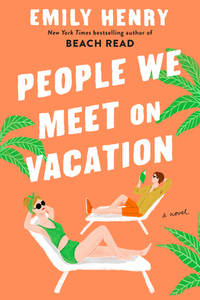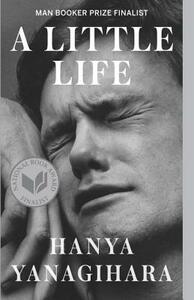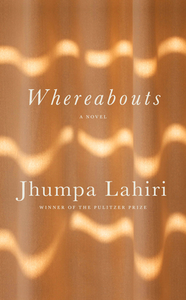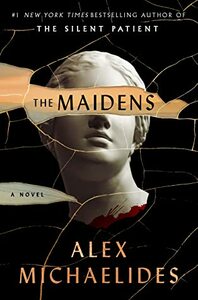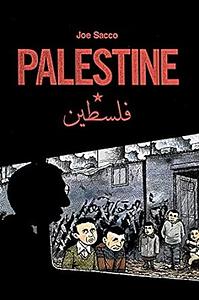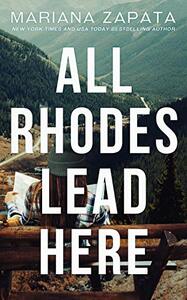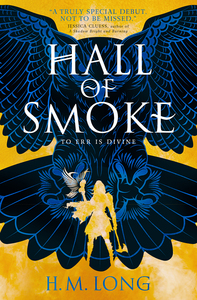You need to sign in or sign up before continuing.
Take a photo of a barcode or cover
whatsshwereading's Reviews (740)
challenging
dark
informative
reflective
sad
tense
fast-paced
Plot or Character Driven:
Plot
Strong character development:
N/A
Loveable characters:
N/A
Diverse cast of characters:
Yes
Flaws of characters a main focus:
N/A
funny
lighthearted
fast-paced
Plot or Character Driven:
Character
Strong character development:
Yes
Loveable characters:
Yes
Diverse cast of characters:
Yes
Flaws of characters a main focus:
Yes
Sweet.
Funny.
Unproblematic.
Em Henry's PWMOV is rom-com done right.
Funny.
Unproblematic.
Em Henry's PWMOV is rom-com done right.
dark
emotional
reflective
sad
tense
slow-paced
Plot or Character Driven:
A mix
Strong character development:
Yes
Loveable characters:
Yes
Diverse cast of characters:
Yes
Flaws of characters a main focus:
Yes
TW: Sexual abuse, physical abuse, pedophilia, self-mutilation, drug-abuse, suicide, grief from death of a loved one, rape, toxic relationships and violence.
A Little Life has got to be one of the most heart breaking books I've ever read. Yanagihara, in devastatingly beautiful prose tells you the story of Jude St Francis, Willem Ragnerson and their world. She brings to life a New York that exists in a vacuum of presentness (no sense which years the book is set in, no indication to real time events) and a host of characters who will endear themselves to you through their sheer devotion for the irreparably damaged Jude. The writing is so compelling that once I started reading, I just couldn't stop. I had to know if Jude gets the happy ending I so desperately wished for him.
“What he knew, he knew from books, and books lied, they made things prettier.”
Whatever you say of Hanya Yanagihara's A Little Life, you could never, ever accuse it of making things prettier. In fact, the opposite. There's just SO MUCH of everything. Yanagihara, herself, said in an interview that she wanted to put in an excess of everything, to see how much a reader could take, how far they could be pushed. I'd say, target achieved. And this is my main grouse with the book. Did Jude really have to go through everything he did? At one point, it got unrealistic - the excess of traumas he's made to undergo, took away from the colossal heartbreak the book would've otherwise caused (not that it didn't. I still think about Jude and weep)
That aside, A Little Life is one of the best odes to adult male friendships that I've read. It's a masterclass in character study and development, a thought-provoking narrative - how mentally exhausting is it to maintain a relationship with someone so damaged that they do not want to be helped? How do you go on, knowing that someone you unconditionally love is bent on destroying themselves? How do you save someone who does not want to be saved?
A Little Life is the kind of book that will be your favourite but one you will never be able to re-read. Did I love the book? I don't know, it's complicated. Did it make me cry? For hours. Will I recommend it? Yes, but with a whole lot of warnings.
A Little Life has got to be one of the most heart breaking books I've ever read. Yanagihara, in devastatingly beautiful prose tells you the story of Jude St Francis, Willem Ragnerson and their world. She brings to life a New York that exists in a vacuum of presentness (no sense which years the book is set in, no indication to real time events) and a host of characters who will endear themselves to you through their sheer devotion for the irreparably damaged Jude. The writing is so compelling that once I started reading, I just couldn't stop. I had to know if Jude gets the happy ending I so desperately wished for him.
“What he knew, he knew from books, and books lied, they made things prettier.”
Whatever you say of Hanya Yanagihara's A Little Life, you could never, ever accuse it of making things prettier. In fact, the opposite. There's just SO MUCH of everything. Yanagihara, herself, said in an interview that she wanted to put in an excess of everything, to see how much a reader could take, how far they could be pushed. I'd say, target achieved. And this is my main grouse with the book. Did Jude really have to go through everything he did? At one point, it got unrealistic - the excess of traumas he's made to undergo, took away from the colossal heartbreak the book would've otherwise caused (not that it didn't. I still think about Jude and weep)
That aside, A Little Life is one of the best odes to adult male friendships that I've read. It's a masterclass in character study and development, a thought-provoking narrative - how mentally exhausting is it to maintain a relationship with someone so damaged that they do not want to be helped? How do you go on, knowing that someone you unconditionally love is bent on destroying themselves? How do you save someone who does not want to be saved?
A Little Life is the kind of book that will be your favourite but one you will never be able to re-read. Did I love the book? I don't know, it's complicated. Did it make me cry? For hours. Will I recommend it? Yes, but with a whole lot of warnings.
Graphic: Pedophilia, Physical abuse, Rape, Toxic relationship, Suicide attempt
emotional
reflective
slow-paced
Plot or Character Driven:
Character
Strong character development:
N/A
Loveable characters:
Yes
Diverse cast of characters:
N/A
Flaws of characters a main focus:
N/A
"Solitude: it's become my trade. As it requires a certain discipline, it's a condition I try to perfect. And yet it plagues me, it weighs on me in spite of me knowing it so well."
-Unnamed narrator
Whereabouts
Jhumpa Lahiri
Whereabouts, originally written in Italian (Dove mi Trovo), is a self-translation by the author Jhumpa Lahiri. It's a short book that functions as a series of vignettes about insignificant events in the life of a forty something unnamed female narrator living in an unnamed Italian city. It's a short book about nothing but everything. It's a short book that is a love letter to solitude but also talks about the price one pays for it. It's a short book in which the silence of a quietly led life is deafening.
I don't think I've had a book speak to me, at least in the recent past, the way Whereabouts did. I don't know if it's because I find solace in self-loneliness or because I am a 30-something woman single by choice or because I work in a University and teach language. Could it be that I found it to be a beautifully written book who's every chapter caresses you like a lover's embrace? Or could it be that the zen like quality of the prose instilled a sense of peace in me. Whatever it is, I loved the book. I haven't read the original (I do not know Italian beyond buongiorno, cara mia, dios mio, grazie & prego.... you get the drift), so I have nothing to compare it with. In any event, I wouldn't want to. Even as I write this review (under the hangover of the book), I am thinking about the narrator and wondering what about her seemingly ordinary life has me so enthralled.
Wherabouts is that rare piece of literature that will find home with a select set of readers. If you're one of those, you will love the book (as I did), if you aren't, then you will find the prose, the pace and the subject tedious; the mundaneness of a quiet life suffocating.
In short, Whereabouts is not a book I will recommend to everyone. It definitely struck a chord with me, whether it will with you, only you can tell
-Unnamed narrator
Whereabouts
Jhumpa Lahiri
Whereabouts, originally written in Italian (Dove mi Trovo), is a self-translation by the author Jhumpa Lahiri. It's a short book that functions as a series of vignettes about insignificant events in the life of a forty something unnamed female narrator living in an unnamed Italian city. It's a short book about nothing but everything. It's a short book that is a love letter to solitude but also talks about the price one pays for it. It's a short book in which the silence of a quietly led life is deafening.
I don't think I've had a book speak to me, at least in the recent past, the way Whereabouts did. I don't know if it's because I find solace in self-loneliness or because I am a 30-something woman single by choice or because I work in a University and teach language. Could it be that I found it to be a beautifully written book who's every chapter caresses you like a lover's embrace? Or could it be that the zen like quality of the prose instilled a sense of peace in me. Whatever it is, I loved the book. I haven't read the original (I do not know Italian beyond buongiorno, cara mia, dios mio, grazie & prego.... you get the drift), so I have nothing to compare it with. In any event, I wouldn't want to. Even as I write this review (under the hangover of the book), I am thinking about the narrator and wondering what about her seemingly ordinary life has me so enthralled.
Wherabouts is that rare piece of literature that will find home with a select set of readers. If you're one of those, you will love the book (as I did), if you aren't, then you will find the prose, the pace and the subject tedious; the mundaneness of a quiet life suffocating.
In short, Whereabouts is not a book I will recommend to everyone. It definitely struck a chord with me, whether it will with you, only you can tell
dark
mysterious
fast-paced
Plot or Character Driven:
A mix
Strong character development:
No
Loveable characters:
No
Diverse cast of characters:
Complicated
Flaws of characters a main focus:
N/A
I cannot believe that this book was written by the same author who wrote the very intriguing and crafty The Silent Patient. In fact, when I finished the book, I wondered if I really like The Silent Patient as much as I thought I did?
The Maidens, is dark academic whoddunnit featuring a group therapist who, herself is struggling with the loss of a loved one. The story is set in Cambridge and like TSP, promised to draw from Greek Mythology. Sounds great right? But yea, the execution didn't really pan out.
Let's start with Mariana Andros, the protagonist. As is the norm in thrillers, she's not had a happy childhood, recently suffers the loss of a loved one and is sort of unstable. She's supposed to be a "brilliant" group therapist - you see zero evidence of this and of that species of women who attract men wherever they go - of course she's not aware of how beautiful she is. Mariana gets called to Cambridge because her niece's best friend is murdered. Once there, for no logical explanation whatsoever, she decides to investigate the murder (that there's a perfectly capable policeman is completely irrelevant). She carries on this (lame) "investigation" with an ineptitude that would make Thomson and Thompson cringe, violates so many ethical principles (doctor patient confidentiality anyone?) it's not even a joke and makes a fool out of herself. She does no work whatsoever - everything is handed to her (for ex, an old friend is the consulting psychologist on the case and just lets her wander anywhere and everywhere. Yes, he's also attracted to her). Maybe Michaelides intended for her to be an unreliable narrator but she's just an irritating one.
My next problem is - why does everyone in thrillers these days go around confiding important details in random strangers? Do they not know how dangerous that is? Especially when it involves a murder? Take for example a guy Mariana meets on her way to Cambridge. This kid, for no reason decides to help her "investigate" and she in turn tells him everything? Umm, what? Also, this kid is a potential love interest. What even? Why even?
Let's now talk about the token diversity - a CI named Sadhu Sangha. What? It sounds like two surnames tacked together. A student named Diya, who's an Indian Princess and a genius. Umm, an Indian Princess named Diya? A genius Asian, you don't say? Edward Fosca, the chief suspect - Italian American with a man bun. Really now? A little research and thinking would've fixed this issue, methinks.
The Greek mythology angle which started off with such promise in the beginning is abandoned in favour of random red herrings, twists and turns. The book would've worked even without the narrative of Demeter and Persephone! What an absolute waste of a concept! See, for me, in thrillers, the end reveal is as important as the rest of the book. All the twists and turns need to add up to that massive reveal. That, in this book, did not happen. Not only did it not happen, it was beyond ludicrous.
Michaelides is a Cypriot. He went to Cambridge. He studied psychotherapy for three years. He interned at a secure unit! The premise of this book is home territory for him. I am so disappointed that I read a murder mystery with logical holes as large as the craters on Moon. To be fair, the only thing I enjoyed reading was his description of Cambridge - the architecture, the porters, the bedders, Punting, pubs and so on. But the rest of, it was a disaster.
I guess The Maidens is the latest victim of the Second Book Curse. However, I am not yet writing Miachaelides off. Let's see if third time will the charm. Until then, you'd do well to steer clear of this book and watch Kate Winslet's excellent turn as Mare of Easttown.
The Maidens, is dark academic whoddunnit featuring a group therapist who, herself is struggling with the loss of a loved one. The story is set in Cambridge and like TSP, promised to draw from Greek Mythology. Sounds great right? But yea, the execution didn't really pan out.
Let's start with Mariana Andros, the protagonist. As is the norm in thrillers, she's not had a happy childhood, recently suffers the loss of a loved one and is sort of unstable. She's supposed to be a "brilliant" group therapist - you see zero evidence of this and of that species of women who attract men wherever they go - of course she's not aware of how beautiful she is. Mariana gets called to Cambridge because her niece's best friend is murdered. Once there, for no logical explanation whatsoever, she decides to investigate the murder (that there's a perfectly capable policeman is completely irrelevant). She carries on this (lame) "investigation" with an ineptitude that would make Thomson and Thompson cringe, violates so many ethical principles (doctor patient confidentiality anyone?) it's not even a joke and makes a fool out of herself. She does no work whatsoever - everything is handed to her (for ex, an old friend is the consulting psychologist on the case and just lets her wander anywhere and everywhere. Yes, he's also attracted to her). Maybe Michaelides intended for her to be an unreliable narrator but she's just an irritating one.
My next problem is - why does everyone in thrillers these days go around confiding important details in random strangers? Do they not know how dangerous that is? Especially when it involves a murder? Take for example a guy Mariana meets on her way to Cambridge. This kid, for no reason decides to help her "investigate" and she in turn tells him everything? Umm, what? Also, this kid is a potential love interest. What even? Why even?
Let's now talk about the token diversity - a CI named Sadhu Sangha. What? It sounds like two surnames tacked together. A student named Diya, who's an Indian Princess and a genius. Umm, an Indian Princess named Diya? A genius Asian, you don't say? Edward Fosca, the chief suspect - Italian American with a man bun. Really now? A little research and thinking would've fixed this issue, methinks.
The Greek mythology angle which started off with such promise in the beginning is abandoned in favour of random red herrings, twists and turns. The book would've worked even without the narrative of Demeter and Persephone! What an absolute waste of a concept! See, for me, in thrillers, the end reveal is as important as the rest of the book. All the twists and turns need to add up to that massive reveal. That, in this book, did not happen. Not only did it not happen, it was beyond ludicrous.
Michaelides is a Cypriot. He went to Cambridge. He studied psychotherapy for three years. He interned at a secure unit! The premise of this book is home territory for him. I am so disappointed that I read a murder mystery with logical holes as large as the craters on Moon. To be fair, the only thing I enjoyed reading was his description of Cambridge - the architecture, the porters, the bedders, Punting, pubs and so on. But the rest of, it was a disaster.
I guess The Maidens is the latest victim of the Second Book Curse. However, I am not yet writing Miachaelides off. Let's see if third time will the charm. Until then, you'd do well to steer clear of this book and watch Kate Winslet's excellent turn as Mare of Easttown.
dark
informative
mysterious
sad
tense
fast-paced
Kashmir - a land that personifies the saying " beauty is a curse". A land that is the purported heaven on Earth. A land nations fight over. The land of apple orchards and snowy peaks. The land of grief, lost hopes and dreams.
Set in this land, against, what seems like a permanent conflict and turbulence, Shabir Ahmed Mir's debut novel, The Plague upon us, is an agonising tale of love, loss, desire, greed, betrayal, power, violence and the idea of freedom.
The narrative is clever - the story told in four tales. It's the same story, mind you; but each revealing a bit more than the previous. The first one leaves you utterly confused, dissatisfied even. You feel that the author packed way too much in the first fifty pages; you're left wondering what's left. Then tale two begins and things start making sense. What I liked the most about SAM's book, though, is how he shows that a combination of forces ( corrupt politicians, profit hungry businessmen, the Army, and so on ) are equally to blame for J&K's plight. None of the characters are likeable ( I don't think they're meant to be ). The ending doesn't offer even a glimmer of hope - but that's in line with current times.
However, for all its merits, there are a few things about the book that irked me:
1. A woman is raped. A young woman. Raped. Yet a couple pages later, she's shown to lead a normal ( if isolated ) life. What gives?
2. The chaotic verse in prose style - first two chapters, the chapters between the tales and the concluding chapters are written this way. It didn't work for and it didn't really feel organic.
3. The author packs way too much in a few pages ( 229 to be precise ). I feel the novel would've benefitted from 100+ pages more and not felt as shallow.
4. Oubaid. The narrator ( I think ). There aren't enough words in any of the languages I know to suitably express how detestable I found him. He's foolish, he's weak, he's, I don't know, unhinged. There's zero explanation for his motivation to do some of the things that he does. Also, the kid has zero self respect.
5. The end was far from satisfactory. Not that I expected a happy ending but what I read, wasn't it.
I don't know what I expected from this book but I am pleasantly surprised by it. I read it one sitting and I didn't come away disturbed or depressed. In fact, the book read more like a thriller. That's not not to say the book didn't affect me. I did learn about a few things I wasn't aware of.
All things considered, I am definitely going to recommend TPUS because it's an own voices that needs to be heard and amplified.
Set in this land, against, what seems like a permanent conflict and turbulence, Shabir Ahmed Mir's debut novel, The Plague upon us, is an agonising tale of love, loss, desire, greed, betrayal, power, violence and the idea of freedom.
The narrative is clever - the story told in four tales. It's the same story, mind you; but each revealing a bit more than the previous. The first one leaves you utterly confused, dissatisfied even. You feel that the author packed way too much in the first fifty pages; you're left wondering what's left. Then tale two begins and things start making sense. What I liked the most about SAM's book, though, is how he shows that a combination of forces ( corrupt politicians, profit hungry businessmen, the Army, and so on ) are equally to blame for J&K's plight. None of the characters are likeable ( I don't think they're meant to be ). The ending doesn't offer even a glimmer of hope - but that's in line with current times.
However, for all its merits, there are a few things about the book that irked me:
1. A woman is raped. A young woman. Raped. Yet a couple pages later, she's shown to lead a normal ( if isolated ) life. What gives?
2. The chaotic verse in prose style - first two chapters, the chapters between the tales and the concluding chapters are written this way. It didn't work for and it didn't really feel organic.
3. The author packs way too much in a few pages ( 229 to be precise ). I feel the novel would've benefitted from 100+ pages more and not felt as shallow.
4. Oubaid. The narrator ( I think ). There aren't enough words in any of the languages I know to suitably express how detestable I found him. He's foolish, he's weak, he's, I don't know, unhinged. There's zero explanation for his motivation to do some of the things that he does. Also, the kid has zero self respect.
5. The end was far from satisfactory. Not that I expected a happy ending but what I read, wasn't it.
I don't know what I expected from this book but I am pleasantly surprised by it. I read it one sitting and I didn't come away disturbed or depressed. In fact, the book read more like a thriller. That's not not to say the book didn't affect me. I did learn about a few things I wasn't aware of.
All things considered, I am definitely going to recommend TPUS because it's an own voices that needs to be heard and amplified.
Graphic: Physical abuse, Rape, Torture, Murder
dark
informative
reflective
sad
tense
medium-paced
"𝑾𝒆 𝒅𝒐𝒏'𝒕 𝒘𝒂𝒏𝒕 𝒎𝒐𝒏𝒆𝒚. 𝑾𝒆 𝒘𝒂𝒏𝒕 𝒐𝒖𝒓 𝒍𝒂𝒏𝒅, 𝒐𝒖𝒓 𝒉𝒖𝒎𝒂𝒏𝒊𝒕𝒚. 𝑨𝒓𝒆𝒏'𝒕 𝒘𝒆 𝒑𝒆𝒐𝒑𝒍𝒆 𝒕𝒐𝒐?" - 𝑨 𝑷𝒂𝒍𝒆𝒔𝒕𝒊𝒏𝒊𝒂𝒏 𝒓𝒆𝒇𝒖𝒈𝒆𝒆 𝒘𝒐𝒎𝒂𝒏 𝒕𝒐 𝑱𝒐𝒆 𝑺𝒂𝒄𝒄𝒐.
Humane (adj): kind, compassionate
Etymology: from the word human. Signifying having human like attributes of kindness. Of being able to treat others with a civil disposition.
The more I see and read of the world and the way of men (& women), the less this word means to me. And this is a feeling that's intensified every time I think, read and hear of Palestine. For how can you justify killing of women and children? Justify Gaza? Justify Occupier Settling? Oppression? Ethnic cleansing? Apathy to the plight of the oppressed and applying the blanket label of terrorists to them?
Joe Sacco uses art to narrate the tragedy that's become Palestine. It's one thing to be reading about the atrocities of Israeli occupation and quite another to see it. And see it in graphic detail you do. Sacco paints himself as a disaffected, entitled white dude chasing "sensational news". Make no mistake, he's no white savior. He chooses to tell story after story after story of injustices, creating a heart-shattering portrait of the every day struggles of Palestinians in Occupied territories - these range from police brutality to inhumane prison conditions to lack of basic supplies afforded to Palestinians to unfair law to feminism to refugees and so on. I had to take frequent breaks and read romance novels in between, just to retain my sanity (yes, I'm well aware of my privilege, thank you)
Palestine is a brilliant (bleak but brilliant) and important graphic novel. Given what's happening around us and the Western Media's pro-Israel stand, it is important that we understand the story from the side of the "evil Palestinians".
In short, what I'm trying to say here is - READ IT.
Humane (adj): kind, compassionate
Etymology: from the word human. Signifying having human like attributes of kindness. Of being able to treat others with a civil disposition.
The more I see and read of the world and the way of men (& women), the less this word means to me. And this is a feeling that's intensified every time I think, read and hear of Palestine. For how can you justify killing of women and children? Justify Gaza? Justify Occupier Settling? Oppression? Ethnic cleansing? Apathy to the plight of the oppressed and applying the blanket label of terrorists to them?
Joe Sacco uses art to narrate the tragedy that's become Palestine. It's one thing to be reading about the atrocities of Israeli occupation and quite another to see it. And see it in graphic detail you do. Sacco paints himself as a disaffected, entitled white dude chasing "sensational news". Make no mistake, he's no white savior. He chooses to tell story after story after story of injustices, creating a heart-shattering portrait of the every day struggles of Palestinians in Occupied territories - these range from police brutality to inhumane prison conditions to lack of basic supplies afforded to Palestinians to unfair law to feminism to refugees and so on. I had to take frequent breaks and read romance novels in between, just to retain my sanity (yes, I'm well aware of my privilege, thank you)
Palestine is a brilliant (bleak but brilliant) and important graphic novel. Given what's happening around us and the Western Media's pro-Israel stand, it is important that we understand the story from the side of the "evil Palestinians".
In short, what I'm trying to say here is - READ IT.
emotional
funny
lighthearted
relaxing
medium-paced
Plot or Character Driven:
A mix
Strong character development:
Yes
Loveable characters:
Yes
Diverse cast of characters:
Yes
Flaws of characters a main focus:
Yes
All you romance writers, take note - THIS is how you write a romance between a happy and a grumpy person! I've read so many romances in the past couple of years and have increasingly gotten annoyed at how a positive/happy/sunshine FP is portrayed. She is either a manic pixie girl or someone with zero respect for boundaries, zero filter, bird-brained, waiting for hidden potential to be unlocked by MP, immature AF. I particularly get triggered when the MP draws boundaries and is labelled a "grumpy asshole" because he won't share. What even!
I've really come to love Zapata's slow-burn, subtly social conscious (a vegan athlete, calling thanksgiving a genocide, a male protagonist who's an ex-porn star) , happy romances. Her female protagonists are real, feel real - they're vulnerable but strong and don't need no man to rescue them.
This is brilliantly done in All Rhodes Lead Here. Aurora is a happy person, she uses the word nice a lot, she smiles a lot but she also respects boundaries, understands the concept of personal space, is sad and acknowledges it, and is a downright badass when it comes down to establishing her self-respect. Aurora and Rhodes don't fall in love or lust immediately. They're adults and act like responsible adults. There's friendship, there's trust, their love is calm, devoid of petty jealousies or displays of toxic, caveman masculinities.
The novel is a slow burn romance but moves faster than Zapata's other books (if you've read them, you'll know what I mean) and is loooooong. But I didn't care about the length. I loved reading about Aurora and Rhodes and Amos and all the other people populating Zapata's small town. Is ARLH the best of her works? No, that'd be The Wall of Winnipeg and Me. Do I recommend it? Hell YES. It's such a comforting, lovely and happy story. Just what we need right now.
Make a cup of tea, sit down with Aurora and allow yourself to be transported
I've really come to love Zapata's slow-burn, subtly social conscious (a vegan athlete, calling thanksgiving a genocide, a male protagonist who's an ex-porn star) , happy romances. Her female protagonists are real, feel real - they're vulnerable but strong and don't need no man to rescue them.
This is brilliantly done in All Rhodes Lead Here. Aurora is a happy person, she uses the word nice a lot, she smiles a lot but she also respects boundaries, understands the concept of personal space, is sad and acknowledges it, and is a downright badass when it comes down to establishing her self-respect. Aurora and Rhodes don't fall in love or lust immediately. They're adults and act like responsible adults. There's friendship, there's trust, their love is calm, devoid of petty jealousies or displays of toxic, caveman masculinities.
The novel is a slow burn romance but moves faster than Zapata's other books (if you've read them, you'll know what I mean) and is loooooong. But I didn't care about the length. I loved reading about Aurora and Rhodes and Amos and all the other people populating Zapata's small town. Is ARLH the best of her works? No, that'd be The Wall of Winnipeg and Me. Do I recommend it? Hell YES. It's such a comforting, lovely and happy story. Just what we need right now.
Make a cup of tea, sit down with Aurora and allow yourself to be transported
dark
informative
mysterious
reflective
tense
fast-paced
Plot or Character Driven:
A mix
Strong character development:
Yes
Loveable characters:
Complicated
Diverse cast of characters:
Yes
Flaws of characters a main focus:
Yes
Steeped in folkore and rich in cultural details of the Santhal community of Jharkhand, Hansda Sowvendra Shekhar's debut is a fascinating family saga touching upon myriad of themes - witchcraft, misogyny, patriarchy, internalized patriarchy, societal hierarchies, sense of community, and motherhood.
While I found the narrative to be disjointed, Shekhar's strong prose and sense of storytelling hooks you from page one. He doesn't shy away from using colloquialisms; his writing generously peppered with santhali language. However, I do wish he'd provided translations for the dialogues (he provides translations in some places, not in most); I had to rely on the context to glean what they could mean and I didn't really care much for that. Plus that one super explicit sex scene. I am still wondering what the point of that was, considering it neither featured the main cast of characters nor added anything to the plot.
Another peeve I had with this book was the hurried ending. Things are going downhill, until, suddenly they are not? Everything is neatly and conveniently tied up. Yet there are so many questions you, as a reader, are left with - What happened to Gurubari? Why did she decide to stop interfering with the Baskey family? How does Rupi go from being bed ridden to be able to walk around?
These of course, are minor complaints. The book, overall, is quite impressive and one I'd highly recommend for fans of literary fiction and those looking to read a good Indian writing in English novel.
While I found the narrative to be disjointed, Shekhar's strong prose and sense of storytelling hooks you from page one. He doesn't shy away from using colloquialisms; his writing generously peppered with santhali language. However, I do wish he'd provided translations for the dialogues (he provides translations in some places, not in most); I had to rely on the context to glean what they could mean and I didn't really care much for that. Plus that one super explicit sex scene. I am still wondering what the point of that was, considering it neither featured the main cast of characters nor added anything to the plot.
Another peeve I had with this book was the hurried ending. Things are going downhill, until, suddenly they are not? Everything is neatly and conveniently tied up. Yet there are so many questions you, as a reader, are left with - What happened to Gurubari? Why did she decide to stop interfering with the Baskey family? How does Rupi go from being bed ridden to be able to walk around?
These of course, are minor complaints. The book, overall, is quite impressive and one I'd highly recommend for fans of literary fiction and those looking to read a good Indian writing in English novel.
informative
reflective
slow-paced
Plot or Character Driven:
A mix
Strong character development:
No
Loveable characters:
No
Diverse cast of characters:
No
Flaws of characters a main focus:
Yes
Didn't work for me. Absolutely didn't.

